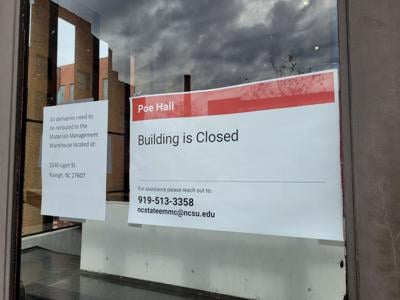A Wake County judge ruled on Wednesday that NC State must allow outside experts to investigate Poe Hall. The ruling comes almost six months after the building’s closure and follows attorneys representing a former employee claiming that the University may have destroyed or altered evidence of PCBs.
The ruling by Superior Judge Hoyt Tessener allows former NC State graduate student Darren Masier and his legal representation to send independent investigators into Poe Hall. The University must permit them access to the building and turn over relevant documents within 30 days.
Masier has terminal cancer that he believes could be a result of his working about 30 hours per week in Poe Hall from 2009 to 2013. He was diagnosed in 2023.
Masier’s attorneys argued testing conducted by environmental consulting firm Geosyntec Consultants was insufficient and the University may have destroyed or altered evidence of PCBs inside Poe Hall due to turning on the HVAC without concurrently testing. Attorneys representing NC State denied the claim and said the University is already working with Geosyntec and does not require more testing.
Geosyntec has completed phase one of testing in Poe Hall but testing air and surface samples with ventilation systems turned off. Additionally, caulk samples were not tested in the phase one investigation by Geosyntec or NC State’s Environmental Health and Safety Experts. Experts told Technician the first phase of testing was atypical and could have yielded inaccurate results.
Chancellor Randy Woodson said on March 25 that the second phase of testing was underway, but attorneys representing NC State said that though the University had turned on the HVAC system in mid-April, it did not take any air samples.
Environmental expert Ranajit Sahu expressed concern in an affidavit about Geosyntec’s testing methods and said their protocols would “not withstand peer review or public scrutiny.” Sahu said he had “serious concerns about the amount of evidence that may be lost” due to NC State turning on the HVAC system without concurrently testing.
Masier’s representatives said NC State had “delayed justice” by denying independent investigators access to the building.
“This notion that the University has been transparent with the public, it has been transparent with its faculty, its students, its alumni about this situation, is simply balderdash,” Masier’s attorneys said in court.
Evidence collected by independent investigators hired by Masier and his representation can only be used in Masier’s specific case.
The ruling also gives Masier the ability to depose University officials. NC State must present witnesses to answer questions from Masier and his representatives within ten days after their questions are delivered.


(0) comments
Welcome to the discussion.
Log In
Keep it Clean. Please avoid obscene, vulgar, lewd, racist or sexually-oriented language.
PLEASE TURN OFF YOUR CAPS LOCK.
Don't Threaten. Threats of harming another person will not be tolerated.
Be Truthful. Don't knowingly lie about anyone or anything.
Be Nice. No racism, sexism or any sort of -ism that is degrading to another person.
Be Proactive. Use the 'Report' link on each comment to let us know of abusive posts.
Share with Us. We'd love to hear eyewitness accounts, the history behind an article.